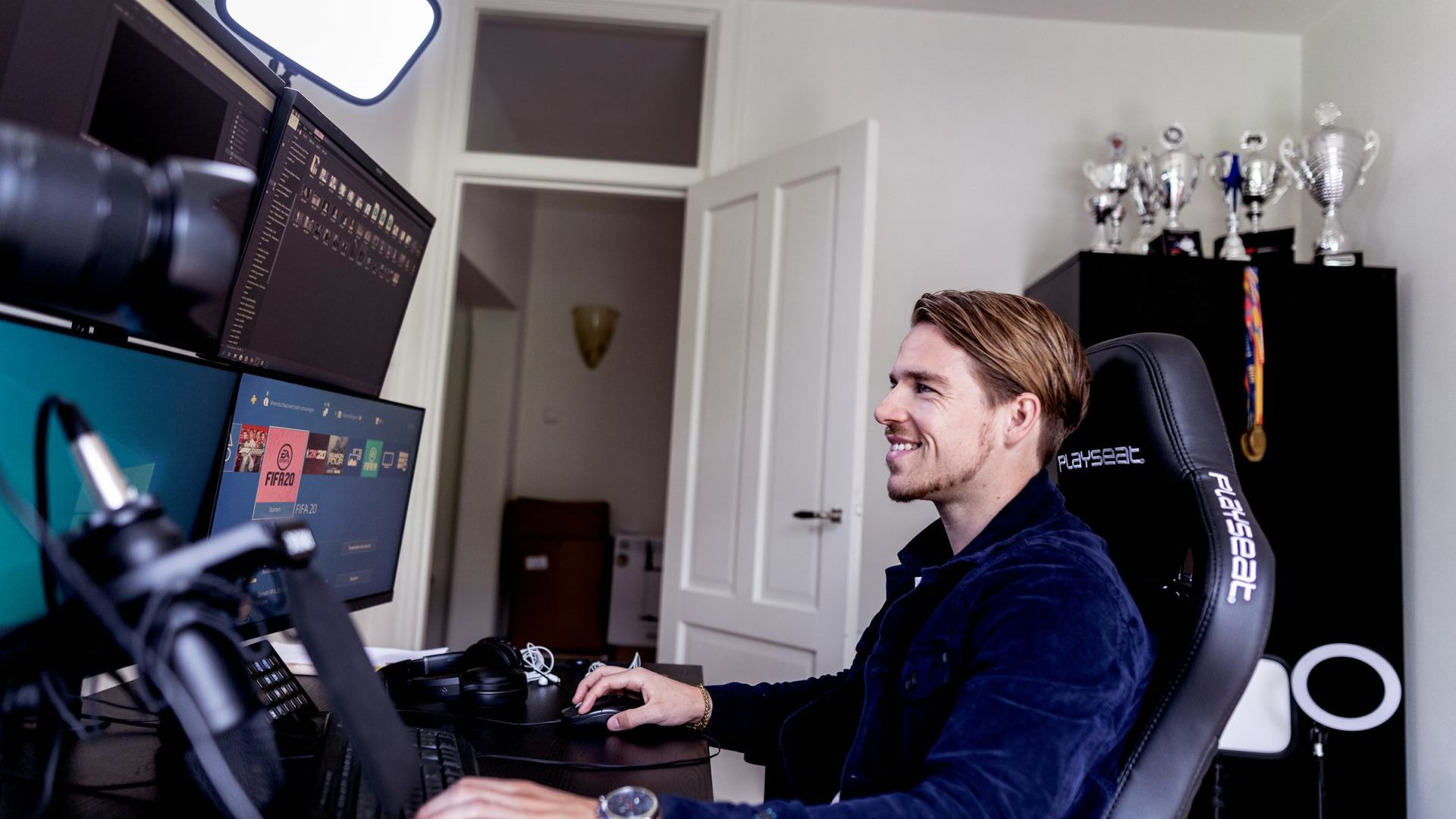‘If you’re a professional gamer, you can call yourself a top sporter’
-
 Koen Weijland. Foto: Duncan de Fey
Koen Weijland. Foto: Duncan de Fey
He was chosen three times as the best FIFA player in the world. In 2016, he became the first professional e-sporter in the Netherlands when he signed a contract with Ajax. Now Koen Weijland, a former student of Business Communications Studies, has become a real influencer even though he hates that word. He has 241,000 followers on his YouTube channel. ‘I was a pioneer, and I’m still reaping the fruits of that.’
No, Koen Weijland didn’t dream about a career as an e-sporter when he was little because, when he was growing up, no one even knew that word. A professional sporter was someone who earned money by playing football or hockey or by ice skating. Gaming was something boys did at home on their PlayStation. ‘My parents were worried about the number of hours I spent gaming,’ Weijland said.
‘My parents were worried about the number of hours I spent gaming’
We’re in Amsterdam, in a light-filled apartment on the Amstel that he recently moved into with his girlfriend Carola Kirschbaum. Carola is a photo model, works in fashion and, like Weijland, she has her own YouTube channel. The lounge sofa that we’re sitting on has been sponsored by an online home furnishing shop and was named after the Radboud alumnus. That’s how things go in the world of Koen and Carola.
A thousand dollars
Weijland was ranked first in the world three times. In 2010, 2011 and 2015 he was named the best FIFA player on the planet. He was the first professional e-football player in the Netherlands when he signed a contract with Ajax in 2016. A real pioneer.
Everything that happened to this former resident of Oosterbeek was new. He had no precedent to follow. He spoke about how, as a student, he travelled all over the world: to tournaments in South Korea, Paris, Berlin. An e-sporter can definitely earn a tremendous amount of money (last year the American winner of Fortnite went home 3 million dollars richer), but that wasn’t true at the time. ‘In the semi-finals of the WC in Paris, I won a thousand dollars.’
When he was 17, Weijland went to university simply because it had never occurred to him that he could ever earn a living with his gaming skills. But now as a 27-year-old, he knows better. It’s been a couple of years since Weijland has been the best FIFA player in the world and his career with Ajax is also a thing of the past, but thanks to his YouTube channel with its 241,000 subscribers and his occasional jobs as a host, he lives off the name he made for himself as the FIFA king.
Not rocket science
But first, let’s return to the town of Oosterbeek in Gelderland at the turn of this century. Weijland’s mother gave him his first (second-hand) PlayStation. Weijland was crazy about football and wanted to become a pro, but wasn’t good enough. So, he thought he’d become a football commentator instead. Jack van Gelder was his great example. Meanwhile, he also became very skilled at playing the football game FIFA. ‘I used to challenge myself’, he said. ‘I practiced against the best gamers in the world. FIFA is definitely not rocket science; you just have to play it a lot at the highest level you can. I’m extremely competitive, always want to be the best.’ He first participated in local tournaments as ‘Koentje 92’.
Despite his gaming, his schoolwork didn’t suffer. Weijland graduated from secondary school with flying colours and registered as a student of Communication and Information Studies in Groningen. ‘I wanted to study as far away from home as possible. During the first few months, I slept at my cousin’s or on a friend’s sofa. That was exactly the time I was at my FIFA prime.’
‘I wanted to study as far away from home as possible’
He had to skip the first examination week because of the WC in Korea, but the optimistic Weijland thought that he’d easily catch up on those courses. Until he was given a negative study advice. ‘I even appealed’, he remembered. ‘I brought newspaper articles with me to show the commission what I’d been doing: playing in FIFA tournaments. But they were uncompromising.’
Back home, he had to confess that he’d messed up academically. Small, shy laugh: ‘I was embarrassed because I’d disappointed my parents.’
What now? Weijland was good at languages. He thought about journalism, but you could only study that at a university of applied sciences. However, the university in Nijmegen had a programme in Business Communication Studies. It looked like a good alternative, so he registered.’
Whiz kid
It was actually just chance that he ended up at Radboud University, he admitted. They were good enough to admit him at the last minute. ‘In hindsight, I was much better off in Nijmegen than in Groningen. I wasn’t the type to join a student association and in Nijmegen I met some good mates.’ But just to be safe, he decided to live with his parents in Arnhem this time.
The e-sporter lived in two totally different worlds; he didn’t fit completely into either of them. In the FIFA universe, he was known as a whiz kid who studied at university. On the campus in Nijmegen, he was regularly absent because he had to go off with his controller.
Did you see yourself as a top sporter?
‘Yes. If you’re a professional gamer, you can call yourself a top sporter. Compared to dart players or top snooker players. The more physically fit you are, the longer your endurance. And don’t forget the pressure that you have to work under. In Paris, I was literally shaking in my boots backstage. You have to score in front of a hall with thousands of people, on an international podium. That’s also top sport. At the critical moment you have to find the right solution to outwit your opponent. When I later started playing for Ajax, I had psychological counselling.’
As a gamer, did you benefit from having a university education?
‘I don’t think so. It’s not always good to think too deeply. Let’s be honest: FIFA is a game. You have to think efficiently and simply. You need a certain tactic to outwit the other, but intelligence doesn’t necessarily make you a better player. The players that now get high scores aren’t super intelligent. When working for Ajax, I benefitted from being able to think at the academic level. As an e-sporter for a professional football club, you have to do more than win online matches: my job was to be a good representative of the club and reach the youngest target group, children who don’t read the paper or watch TV. So you have to think carefully about how to put things into words. There’s a reason that professional football players get media training.’
When Weijland was approached by Ajax, he was 23. His contract as the first e-sporter for a Dutch football club was a dream come true (but one he’d never actually had). Edwin van der Sar presented him with the official club shirt, with number 39. Clubs like VfL Wolfsburg and Manchester City had already contracted e-football players, and the club in Amsterdam followed that example. Why? To attract the very youngest fans. The strategy was to inspire a club feeling among children via their favourite game of FIFA.
‘Ajax was so big; I saw this as a huge opportunity’
‘Ajax was so big; I saw this as a huge opportunity. I wanted to make the most of it. At the time, I still enjoyed going to parties, but I immediately stopped drinking. I didn’t want to run the risk of being seen drunk somewhere. I really had a lot to lose with Ajax. Plus, I also wanted to show that I really enjoy sports. It wouldn’t have felt right if I just stimulated young people to start gaming a lot; I also wanted to bring across the message that playing sports is healthy. And that it’s okay to game for a couple of hours a day as long as your schoolwork doesn’t suffer, and you don’t become socially isolated.’
Weijland said that he saw little of his friends in those days. In fact, he neglected them. Too busy with his own career. He played tournaments for Ajax and he hosted programmes. After two years, his contract wasn’t renewed because he was no longer the world’s best FIFA player.
Were you born too soon? If you were now at your peak, you’d be rich.
‘Yes and no. The prize money is so much higher now, but in my time there were fewer good players. There were only about three guys who could beat me, now there are forty. I was a pioneer and I’m still reaping the fruits of that. I’ll always be the Netherlands’ first professional e-football player, a status that opens doors.’
Could you have continued to play longer?
‘Yes, there are guys in their late twenties and early thirties who are really good. But I have other ambitions. When I was 17, I enjoyed devoting a lot of time to gaming. But I also had the idea of becoming commentator. Ajax was a good step in that direction. I’d spoken with the NOS earlier about working there, but I had nothing to show them at the time.’
In 2015, Weijland started his own YouTube channel with the support of Endemol. He shared tips and tricks about FIFA online and played games against well-known football players. His channel was first called King FIFA, but now he makes an independent programme under his own name. He makes videos in his own studio at home and posts them weekly. He not only wants to help his followers improve their game skills, but he hopes to inspire young viewers in particular to adopt a healthy lifestyle. In addition, he regularly analyses e-division games on FOX Sports. He hopes to have his own talk show one day.
‘I definitely don’t play a role online, I’m not a caricature of myself’
The well-groomed Weijland is known among FIFA players and people often approach him on the street or want to have their photo taken with him. ‘I don’t mind. It’s fun if people see you as their idol. It takes courage for them to ask me if I want to have my photo taken with them. I always try to appreciate and embrace that.’
Before Weijland started this morning’s interview, he’d gone to the sports school, like he does every other morning. He has a trained body and he still hardly drinks any alcohol. He’s constantly aware of his function as a role model. And even though he hates the word, he falls into the category of influencers. The YouTuber earns his money from sponsorships and advertisements that he posts on his channel. He’s always enthusiastic online.
Do we see the real Koen on YouTube or are you playing a role?
‘I might seem more enthusiastic than I really am because I’m making a programme. YouTube is a special world; it’s strange that there are people who can talk about a bag for an hour and that other people watch them. But I always try to bring something educational to my videos. Last year I ran the Amsterdam marathon to collect money for Only Friends, a foundation for children and young people with a disability. I definitely don’t play a role online, I’m not a caricature of myself. And I do a lot of livestreams, when I record live for three or four hours and people can participate via the chat. You can’t pretend to be different than you really are for such a long time.’
You stopped studying at Radboud University after completing your Bachelor’s. Will you do a Master’s?
‘Sometimes I think about it. I have the feeling that I haven’t been completely academically trained, that the process isn’t finished yet. If people ask me if I’ve ever studied, I always say: yes, but I only have my Bachelor’s. The problem is that I don’t know which Master’s programme I’d like to follow. It has to be of some use to me.’
What did the university teach you?
‘Discipline. In Nijmegen I had to finish my Bachelor’s in just three years since I would’ve otherwise had to pay. I was so involved with FIFA that I still had to get 80 credits in my last year. And I succeeded. It’s not like I can now recite knowledge that I learned during my studies, but I did learn to fully commit myself.’
Top football players often become a coach after their playing career. Is that what lies ahead for you?
Weijland becomes silent for the first time and looks uneasily from the window to the door. He’s not allowed to say anything, he then whispers. ‘But something about this will probably be announced shortly.’





